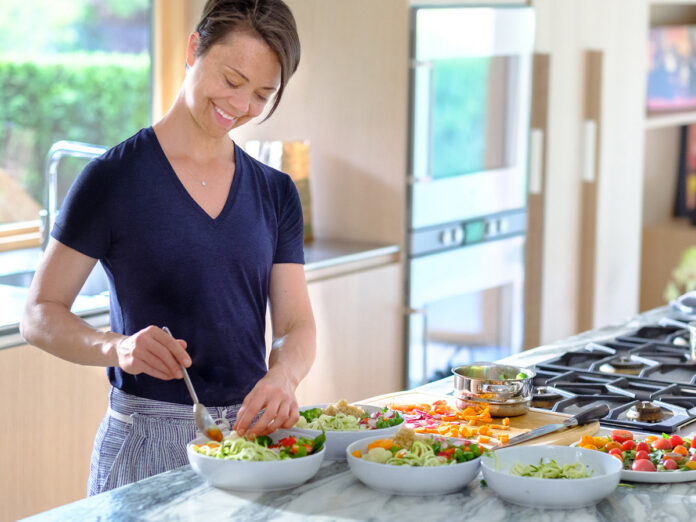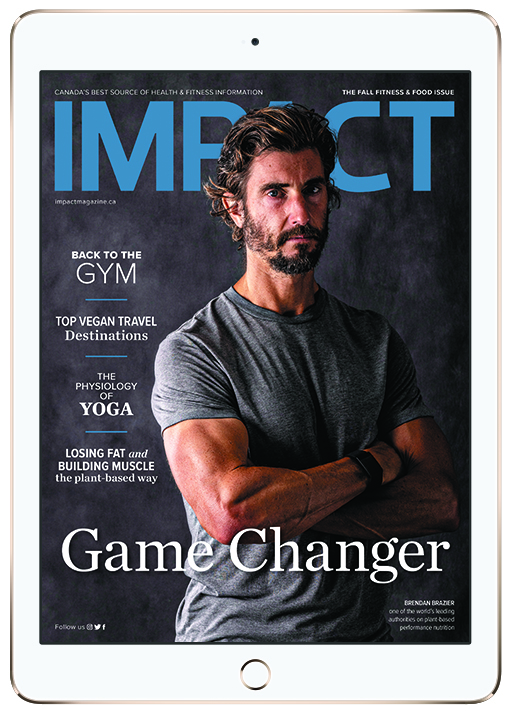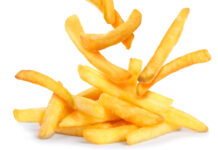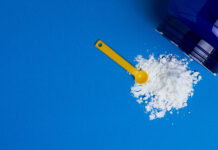
All too often when people hear about a plant-based diet it sparks a question: will it help me lose weight and get back into shape? Firstly, let’s acknowledge that only a healthy body can achieve and maintain a normal weight. Our body is incredibly intelligent, and it never behaves irrationally. If it gets overloaded with stress, environmental toxins, nutritional deficiencies, too many calories, too little sleep and many more imbalances, it will not be able to digest and metabolize food efficiently. This chronic physical and emotional stress will result in toxicity and excess body weight.
COMMON FACTORS THAT CAUSE WEIGHT GAIN:
- Eating a highly processed diet of nutrient-depleted foods
- Overconsumption of acid-forming foods and supplements
- Overworking
- Overtraining
- Overstimulation of senses
- Exhaustion
- Lack of sleep
- Irregular eating habits
- Heavy nighttime meals
- Overeating
- Stimulants such as coffee, tea and cigarettes
- Not drinking enough water
- Feeling unfulfilled and dissatisfied
- Alcohol consumption
- Unresolved conflicts (impairing digestion)
- Fear, worry and other emotional upsets
- Environmental toxins and pollution (air, water, soil)
If your goal is to lose body fat and achieve a healthy weight, forget the newest crash diet, extreme workouts, supplements or diet pills, and concentrate on reducing stress, detoxifying and healing your body. Consider the following strategies to help you reach your goals.
HEALTHY WEIGHT LOSS STRATEGIES
- Eat primarily organic, plant-based foods that are minimally processed.
- Eat smaller meals throughout the day.
- Favour alkaline-forming, low-calorie, nutrient-rich raw foods.
- Slow down your meals and enjoy each bite of your food.
- Do not eat when ill or upset.
- Hydrate with pure water.
- Prioritize a good night’s sleep.
- Maintain emotional balance; release worry, fear and anxiety, jealousy, stress and resentment through physical exercise and deep breathing.
- Live in a place that contributes to good health (fresh, clean air, low crime rate, etc.)
- Develop loving and supportive relationships with your partner, family and friends.
Your health and body composition will improve automatically once you remove toxicity and keep your body and mind open and clean.
LEAN MUSCLE BUILDING
The best way to build new muscle tissue is to regularly challenge your body with intense resistance training and nourish it with the right building blocks. When it comes to training, choose exercises that are difficult yet safe and that you enjoy. Make strength training part of your lifestyle. Each time you train, you will create small micro-tears in your muscles as you challenge your body with more repetitions and heavier weights. This micro breakdown in the muscle tissue doesn’t stop at the end of the workout, it continues even after your last rep. That’s why proper nourishment is a crucial component of muscle growth. By giving your body the right nutrients it needs to repair these tears, your muscles will rebuild, growing bigger and stronger. Following the principles of the whole food plant-based diet is an ideal place to start; however, if your goal is to build lean muscle mass, you will have to put particular emphasis on the amount of food you consume—you’ll need plenty of lean protein, quality carbs and healthy fats, too.
LEAN PROTEIN
Protein is the building block of muscle tissue, and you will need quality protein, in larger quantities than non-athletes, to grow and maintain lean muscle. Protein comprises a variety of amino acids; some amino acids are essential to obtain from the diet; others, your body can produce itself. By including a variety of lean, plant-based protein sources, you ensure that your amino acid needs are being met. How much protein do you need to gain lean muscle? Over the years, I have found that most people, myself included, who eat a whole food plant-based diet and lift weights regularly need roughly 0.5 to 0.75 grams of protein per pound (455 g) of body weight each day to achieve their desired body composition. So, if your goal is to be 130 pounds (59 kg), lean, muscular, and vibrant, then you will want to aim for a minimum of 75 grams of high-quality, bio-available plant-based protein per day.
QUALITY CARBOHYDRATES
Carbs often get a bad rap, but when you’re building muscle they are just as important as protein. Carbohydrates provide your body with energy. Muscles can store energy from carbohydrates and use them as fuel during workouts. However, because muscles can only store a limited amount of these carbs, you have to consume more before, during and after your training session. Doing this will give you the energy you need to fuel a powerful workout and allow you to recover faster.
HEALTHY FATS
Don’t neglect fat in your diet, even if your goal is to shed body fat while you build or maintain lean muscle. Healthy fats, such as cold-pressed oils, nuts, seeds, avocado, chia and hemp, play an important role in metabolizing the food you eat. Without dietary fat, your body cannot absorb vitamins A, D, E and K. Fat is also essential in the production of hormones, necessary for the lubrication of joints and helps protect muscle tissue from breaking down.
FIVE HABITS FOR LASTING RESULTS
- Eat Real Food
Walk into the average supermarket and you will find a variety of processed vegan products—sausages, cheese, yogurts, burgers, ice cream and other food-like substances made to mimic various animal products. Although these foods might be tempting, many of them are over-processed and nutrient-depleted. Make sure you’re not relying on these vegan convenience foods and instead eat real food. - Abundance, not Restriction
Do not starve yourself to get lean! Aim to fill three-quarters of your plate with foods that are lower in caloric density yet satisfying. Main food staples should be grains (whole grain rice, quinoa, wild rice, buckwheat, millet) and of course vegetables (particularly green vegetables), beans, fruit, nuts and seeds. Eat until you are satisfied. - Ditch the Processed Sugar
Keep a closer eye on your daily sugar intake. Become aware of what’s in your food. Added sugar lives in processed foods, even foods you wouldn’t expect (such as salad dressings, granola, bread or protein bars). - Alcohol
If your goal is to lose fat and enjoy vibrant health, consider cutting back on drinking. Alcoholic drinks are empty calories. They provide little to no nutritional value. Also, while the liver is busy metabolizing alcohol, it is unable to metabolize fat. Alcohol is not treated as a nutrient by the liver, it is treated as a poison. It wraps it up in a fat cell and stores it which is why it sabotages your health and body composition. - Eating Out
Eating out should be a treat, not a convenience. Make the time to prepare healthy meals most of the time and save your eating out experiences as a treat or highlight of your week, rather than a quick and easy way to get food.
Overall, if your goal is to lose fat and gain muscle, you need to step outside your comfort zone regularly. Train hard, eat clean, get enough rest and keep your thoughts positive and you will see results.
You May Also Like
Healthy Eating
Photography by Jenna Jones

Read This Story in Our 2022 Fall Fitness & Food Digital Edition
Featuring Brendan Brazier, athlete and pioneer in the plant-based sports nutrition industry. Trail Running 101 – plus this year’s Trail Running Shoe Review. Travel around the world to the top vegan-friendly destinations, recipes and much more!















